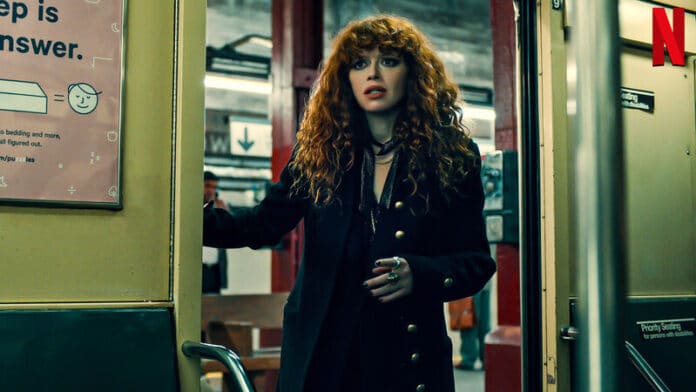Russian Doll Season 2 review – There are so many ways that revisiting the past for ‘Russian Doll’ could have gone wrong, which is precisely the idea of Season 2.
Season 2 of ‘Russian Doll,’ Netflix’s strange and bizarre sci-fi dramedy series co-created by Natasha Lyonne, Leslye Headland, and Amy Poehler, is about family and time travel. In the flashback episodes regarding her mother Lenora (Chloe Sevigny) in season 1, we got a taste of how turbulent Nadia’s (Lyonne) upbringing was. The second season gives Nadia a deeper insight into her past by transporting her to 1982.
When “Sophie’s Choice” had just been shown in theatres, John LeBoutillier was a prominent New York politician, and the world was perennially on the point of nuclear catastrophe.
In this comedy-drama series, Emmy-nominated actress Natasha Lyonne plays Nadia, a young woman on a quest to be the guest of honour at a party in New York City. But she gets stuck in a strange loop, attending the same event over and over again and dying at the end of the night each time, only to wake up the next day unhurt as if nothing had happened.
In addition to starring in the Netflix original sitcom, Lyonne co-created it with “Saturday Night Live” alum Amy Poehler and acts as a writer and director. Because, at least in part, it delivered a truly innovative story within the restrictions of a generic cliché like time loops, the first season of ‘Russian Doll‘ earned such overwhelmingly good comments. Time travel is a story device that is becoming increasingly popular.
Nonetheless, Lyonne, Headland, Poehler, and their crew succeed in offering something new and intimate in the sophomore season, proving that the three-year gap between the two seasons’ releases was well worth it.
Must Read: Russian Doll Season 2 Release Date, Cast & Spoiler

‘Russian Doll’ Season 2 Review – What Will Happen Next?
Nadia appears to have greater influence over her life in season 2. She has chosen a modest party with Alan (Charlie Barnett) for her 40th birthday, much to the dismay of her best friend Maxine (Greta Lee). She and Alan had spent the previous three birthdays on high alert, walking on eggshells to avoid repeating the cycle of death. Control, on the other hand, is rarely synonymous with happiness, and the pursuit of the latter becomes a key subject in season 2.
Nadia travels the 6 trains to see Maxine one evening and finds herself in the body of her very pregnant mother. Nadia has no idea how to deal with these strange events at first, other than to accuse the world of deliberately trying to annoy her. But then she starts to see this as an opportunity to reroute her path in life.
Season 2 of ‘Russian Doll’ is about the big “what ifs” in our life. Many of us had had regretful moments when we went in the wrong direction because of decisions made by ourselves or individuals close to us. There are numerous films and television series that blend this wistfulness into a family or time travel plot.
I’m thinking of the ‘Back to the Future‘ trilogy and ‘The Time Traveler’s Wife.’ The fanciful storyline of ‘Russian Doll,’ on the other hand, and how delightfully dark it gets at moments, set it distinct.
Nadia Vulvokov is a fantastic lead character. Her charisma is appealing enough to draw the audience in like moths to a flame, despite the fact that she is a fundamentally damaged character. Lyonne captures her with just the right amount of fragility and toughness for a New Yorker.
Part of it, I believe, is owing to the series’ semi-autobiographical aspect, but it doesn’t detract from Lyonne’s performance. Throughout the series, she makes objectively risky decisions while leading a cast of equally skilled people.
Time and space and whatever.
Russian Doll returns April 20, only on Netflix. pic.twitter.com/vU8nY0RbKG
— Russian Doll (@RussianDoll) April 7, 2022
Alan Zaveri, played by Charlie Barnett, is compassionate, peaceful, and the perfect contrast for Nadia’s reverberant and restless personality, much as he was in the first season. Alan has his own path of self-discovery in Season 2, which is no less significant than Nadia’s. But it is Elizabeth Ashley and Annie Murphy, who play two versions of Ruth, Nadia’s the only actual mother figure, who gives the season’s best performances.
As Season 2 draws to a close, it becomes increasingly allegorical, fully embracing its science-fiction credentials while highlighting the innate humour hidden in each of its sequences. Season 2 of ‘Russian Doll’ is inventive, memorable, and stays with you long after you’ve finished viewing it. The first season, despite its brief runtime (24-30 minutes), had some pace concerns.
Season 2 seemed to have taken care of it. Even if it isn’t the only setting of the second season, the New York of the 2020s is still very much a component of the tale. The Big Apple remains a live, breathing organism in ‘Russian Doll,’ with a symbiotic relationship with its residents. From 77th Street to the 6 trains to instantly distinctive accents, it lives on in the imaginations of its citizens and as a collection of locales and things.
Season 2 of “Russian Doll” will launch on Netflix on Wednesday, April 20.














